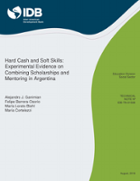Hard Cash and Soft Skills: Experimental Evidence on Combining Scholarships and Mentoring in Argentina
Date
Sep 2018
Many developing countries offer cash to low-income families to encourage children to attend school. These initiatives have increased educational attainment, but they have rarely improved student achievement. One potential reason may be that beneficiaries may need additional support to develop the requisite “soft” skills to succeed in school. We conducted a three-year randomized evaluation of a program that provides secondary school students with scholarships and non-academic mentoring in the Province of Buenos Aires, Argentina. The program improved students’ academic behaviors (e.g., starting to study early before an exam or catching up on schoolwork missed due to absences). Yet, we find little evidence that it improved their academic mindsets (e.g., self-beliefs about performance and efficacy), perseverance (e.g., grit), or learning strategies (e.g., metacognition). The program also improved some metrics of school performance (e.g., language grades, student absenteeism, grade failure, and the number of failed subjects) on its first year, but we cannot detect similar gains in subsequent years. This fadeout may be due to the fact that a large share of treatment students were expelled from the program for not meeting its requirements. We do not find any evidence that the program improved students’ achievement in math and reading or their personality traits.




